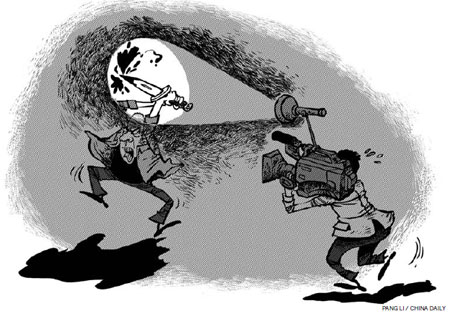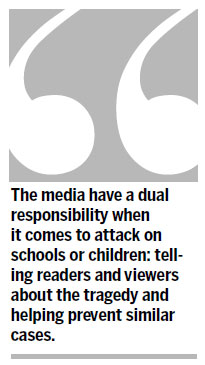Avoid detailed reporting on violence
Updated: 2012-12-20 08:06
By Li Yang (China Daily)
|
||||||||


Do newspapers, TV channels and new media know that their vivid coverage of the knife attack in a school could instigate another Min Yongjun to target children?
Min Yongjun, an epilepsy patient, is accused of attacking and injuring 23 children in a primary school and an old woman in a nearby home in Guangshan county, Henan province, on Dec 14. Min has confessed that he was obsessed with rumors that the world would end on Dec 21 and thought he could "prove his worth as a man" before doomsday by attacking children, because he had learned from a TV program two years ago that a person could "become a TV star overnight by killing children".
Min's confession has set the alarm bells ringing, raising questions on whether the media should continue to cover attacks on schoolchildren in gory details in an effort to sensationalize them.
On one hand, people have the right to know what endangered or could endanger public safety. On the other, there is always the fear that vivid coverage of such incidents could encourage some potential criminals to go on the rampage. It's high time the media faced up to this reality and covered such incidents responsibly.
From March to August in 2010, 22 people died and 85 were injured in seven attacks on school students in Fujian, Guangdong, Jiangsu, Shandong and Shaanxi provinces, and the Guangxi Zhuang autonomous region.
There is no doubt that the authorities should increase their budget on education, especially on safety measures for schools, because most schools and kindergartens lack security guards and security equipment. The media, on its part, should review its role in the aftermath of the Guangshan school attack and focus on how they could prevent such tragedies.
To begin with, the media should decide what to and what not to report after an attack on a school or children. They should know that some things are better left unsaid.
According to the four villagers who brought Min down with the help of a school guard and Min's own confession, he clearly knew what he was doing. His obsession with doomsday rumors motivated him to do something to become a "worthy man" and the TV program he had seen two years ago influenced him to go on the rampage.
In fact, the dangerous effects of sensational reporting on such incidents were already evident in 2010. Six of the seven killings in six different places between March 23 and May 12, 2010, were carried out in similar style. And all the perpetrators had chosen their targets beforehand.
In the past, students majoring in journalism were told to avoid reporting in details how a crime had been committed for fear that other people would imitate them. But today most of the media outlets, especially the tabloids, tend to sensationalize crime and violence to sell their "stories".
Even a cursory look at the reports on school attacks will tell us how the attackers got the weapons, how they planned their attacks and how they chose their targets. Few, if any, reports give as much coverage to how the judiciary dealt with them or whether the attackers were finally proved mentally challenged or not. Such media coverage could create the wrong impression about attackers and the punishment they are handed down.
Just a few days ago, the media were agog with detailed descriptions of how some suspects abducted and treated hostages. The public could do without such sensational bits of information. Instead, the media could focus on detailed follow-ups on how criminals are punished to deter people from crime.
The media have a dual responsibility when it comes to attack on schools or children: telling readers and viewers about the tragedy and helping prevent similar cases. If the media sensationalize the first part, they could fail to fulfill their second objective.
The Chinese media should use the latest attack on schoolchildren to think how to prevent such cases. They could, for example, appeal to education, public security and healthcare authorities to take precautionary measures to protect children. Besides, if the attack prompts the government to make treatment of critically mentally challenged patients mandatory, many lives could be saved.
The traditional media should not forget its role as a watchdog. It shouldn't try to blindly follow new media. Min's case has highlighted the evil effects of a rumor. The doomsday rumor has been widely circulated on the Internet, and many e-commerce businesspeople have used it to sell their products. Very few reports have questioned the practice of using public paranoia to make profit.
Most of the traditional media began refuting the rumors only this week. Had they, including newspapers and TV channel taken up the responsibility of telling people how unscientific the rumor was, the attack on the Guangshan school could have been avoided.
The mass media, traditional as well as new, should do whatever it takes to fulfill their social responsibility.
The author is a writer with China Daily. liyang@chinadaily.com.cn.
(China Daily 12/20/2012 page9)

 Relief reaches isolated village
Relief reaches isolated village
 Rainfall poses new threats to quake-hit region
Rainfall poses new threats to quake-hit region
 Funerals begin for Boston bombing victims
Funerals begin for Boston bombing victims
 Quake takeaway from China's Air Force
Quake takeaway from China's Air Force
 Obama celebrates young inventors at science fair
Obama celebrates young inventors at science fair
 Earth Day marked around the world
Earth Day marked around the world
 Volunteer team helping students find sense of normalcy
Volunteer team helping students find sense of normalcy
 Ethnic groups quick to join rescue efforts
Ethnic groups quick to join rescue efforts
Most Viewed
Editor's Picks

|

|

|

|

|

|
Today's Top News
Health new priority for quake zone
Xi meets US top military officer
Japan's boats driven out of Diaoyu
China mulls online shopping legislation
Bird flu death toll rises to 22
Putin appoints new ambassador to China
Japanese ships blocked from Diaoyu Islands
Inspired by Guan, more Chinese pick up golf
US Weekly

|

|






